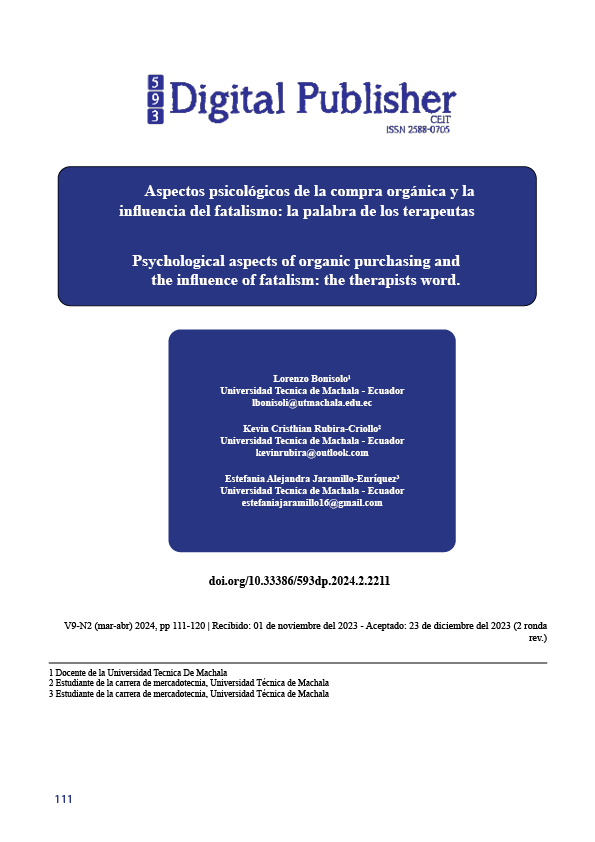Psychological aspects of organic purchasing and the influence of fatalism: the therapists' word
Main Article Content
Abstract
The growing demand for organic products is closely linked to concerns about health and sustainability, reflecting the trend of individuals adopting a conscious lifestyle. However, decision-making in the purchase of organic products is not solely a response to these considerations but is strongly influenced by psychological factors.
The primary objective of the present research is to comprehensively analyze the purchase of organic products and the impact of fatalism on this process. Fatalism, characterized by passive acceptance of events, tends to predispose individuals to resignation rather than actively seeking change. To carry out this analysis, a qualitative study has been developed, focusing on conducting interviews with clinical therapists. These professionals serve as invaluable sources of knowledge due to their expertise in analyzing the psychological aspects that guide human decisions in response to factors such as social pressure, anxiety, and fatalism.
The results emphasize the importance of resisting the influences of social pressure, promoting self-affirmation, and mitigating tendencies toward negative self-assessment. Additionally, the relationship between anxiety and exposure to misinformation, which can distort perceptions of health and well-being, is examined. Together, these psychological elements play a decisive role in the choice of purchasing organic products and in mental health, underscoring the importance of understanding these influences to empower individuals in making informed decisions and pursuing comprehensive well-being. Finally, this study highlights that fatalism can be overcome with proper support and the application of cognitive-behavioral therapy, offering a glimmer of hope for change.
Downloads
Article Details

This work is licensed under a Creative Commons Attribution-NonCommercial-ShareAlike 4.0 International License.
1. Derechos de autor
Las obras que se publican en 593 Digital Publisher CEIT están sujetas a los siguientes términos:
1.1. 593 Digital Publisher CEIT, conserva los derechos patrimoniales (copyright) de las obras publicadas, favorece y permite la reutilización de las mismas bajo la licencia Licencia Creative Commons 4.0 de Reconocimiento-NoComercial-CompartirIgual 4.0, por lo cual se pueden copiar, usar, difundir, transmitir y exponer públicamente, siempre que:
1.1.a. Se cite la autoría y fuente original de su publicación (revista, editorial, URL).
1.1.b. No se usen para fines comerciales u onerosos.
1.1.c. Se mencione la existencia y especificaciones de esta licencia de uso.
References
Aashiq, H. L., & Irfana, R. (2023). Sostenibilidad de la agricultura ecológica: una revisión a través del efoque de tres pilares. Sustainability, Agri, Food and Environmental Research, X(11). https://doi.org/http://dx.doi.org/10.7770
Andrade, C., & Ayaviri, D. (2018). Demanda y Consumo de Productos Orgánicos en el Cantón. Informacion tecnologica, 29(4), 217-226. https://doi.org/10.4067/S0718-07642018000400217
Barreiro, A., & Zubieta, E. (2011). Parsimonia cognitiva y legitimación de las injusticias sociales: la creencia en el mundo justo y el fatalismo latinoamericano. (Vol. 18). Anuario de investigaciones. http://www.scielo.org.ar/scielo.php?script=sci_arttext&pid=S1851-16862011000100023
Benvenuto, R. (2019). Fatalismo. Estudios Kantianos, 7(1), 39-50. https://doi.org/10.36311/2318-0501
Bhatt, Priyanka; Singh, Sanjit;. (28 de marzo de 2023). Predecir la intención de compra de alimentos orgánicos con la asociación de la teoría del comportamiento planificado. https://doi.org/10.1016/j.matpr.2023.03.359
Bojorquez Carrillo, A. L., Flores Novelo, A., & Hernández Islas, M. N. (2022). Factores que inciden en la conducta de compra de productos agroecológicos en Mérida, Yucatán, México. Entreciencias: Diálogos en la Sociedad del Conocimiento, 10(24). https://doi.org/https://doi.org/10.22201/enesl.20078064e.2022.24.82490
Castaño, L., Castro, M., Vergara , S., Martinez, X., & Paniagua, L. (2022). Los consumidores de alimentos orgánicos, ¿es posible construir política pública? Estudio de casos de Medellin. Nutricion hospitalaria, 36(3), 640-646. https://doi.org/10.20960/nh.2022
Cossio Andia, E., Villazon Pardo, P. S., Campero Argote, J., Choque Soto, N., Escobar Ortuñ, B., Rodrigues Correi, T. R., . . . Mejia, C. R. (2021). Conocimiento básico asociado al fatalismo generado por el COVID-19 en estudiantes de medicina de Bolivia. Boletín de Malariología y Salud Ambiental, 61(2), 7. https://doi.org/10.52808/bmsa.7e5.61e2.015
Gomez, B., Valenzuela, D., & Gomez, D. (2020). Alimentos orgánicos en Hermosillo, Sonora: disposición a pagar y preferencias del consumidor. Revista de alimentacion contemporanea y desarrollo regional, 30(55), 2-30. https://doi.org/10.24836/es.v30i55.877
Gutierrez, D., Jimenez, K., & Azuela, J. (2019). Intencion de compra verde (Vol. 49). Investigacion administrativa. https://doi.org/https://www.redalyc.org/journal/4560/456061607007/
Jones, A. (2019). Organic farming: Environmental and economic impacts. 10(53), 5423-5431.
Lopez, A. (2019). Fatalism among Latinos: Evidence from the California Health Interview Survey. Fatalism among Latinos: Evidence from the California Health Interview Survey." Hispanic Journal ofHispanic Journal of Behavioral Sciences, 3(41), 363-378.
Martínez Salazar, G., Oaxaca Torres, J., & Guerra Martínez, R. (2011). Revista Mexicana de agronegocios, 15(28), 503-513.
Martinez, S. (2018). Consumer perceptions of organic food production and farm animal welfare. Food Quality and preference(64), 141-148.
Medina, C., Molina, S., Rios, W., & Marin, A. (2021). Influencia de los anuncios publicitarios en redes sociales en la respuesta emocional y la intención de compra de bebidas lácteas funcionales. Interdisciplinaria, 38(2), 167-18. https://doi.org/10.16888/interd.2021.38.2.11
Mejia, C. R., Sancho, A. Q., Alarcon, F. R., Valero, L. C., Ponce López, V. L., Varela Villanueva, E. S., . . . Vera Gonzales, J. (25 de 02 de 2020). Factores asociados al fatalismo ante la COVID-19 en 20 ciudades del Perú en marzo 2020. Revista Habanera de Ciencias Medicas, 12(2), 13.
Ortega, G. J. (2022). La agricultura orgánica: verdades o mitos. Journal of the Selva Andina Research Society, 13(2), 95-99. https://doi.org/https://doi.org/10.36610/j.jsars.2022.130200095
Rodriguez, L. (2017). Psychological factors influencing organic food purchanse intentions: A review. Bristish Food Journal, 6(119), 1297-1313.
Salgado , B., & Beltran, M. (3 de Diciembre de 2011). FACTORES QUE INFLUYEN EN EL CONSUMO SUSTENTABLE DE PRODUCTOS ORGÁNICOS. Universidad y ciencia, 27(3), 265-279.
Sanchez, E. (2020). Fatalistic Beliefs and Health Promotion Behaviors among Latinas. Journal of health psychology, 7(25), 889-900.
Smith, J. (2020). The Health and Environmental Benefits of Organic Food. Journal of Sustainable Agriculture, 7(44), 678-691.
Soto, G. (2020). El continuo crecimiento de la agricultura orgánica: Orgánico 3.0. Revista de Ciencias Ambientales, 54(1), 215-226. https://www.redalyc.org/articulo.oa?id=665070594013
Valdez, G., Grace, S., & Berenice, J. (2020). Análisis de la confianza, lealtad e intención de compra digital de los consumidores post-millennials. Revista EspaciosRevista Espacios, 41(34), 141-154.
Velástegui, P. (2019). Latin America at a Crossroads:A Cultural Theory to Address the Wicked Problem of Regional Integration with Clumsy Solutions. Revista de relaciones internacionales, estrategia y seguridad, 14(2), 33-57. https://doi.org/10.18359/ries.2889
Yadav, R., & Pathak, G. (2017). Determinantes del Comportamiento de Compra Verde de los Consumidores en una Nación en Desarrollo: Aplicación y Extensión de la Teoría del Comportamiento Planificado (Vol. 134). Ecological Economics. https://doi.org/10.1016/j.ecolecon.2016.12.019




